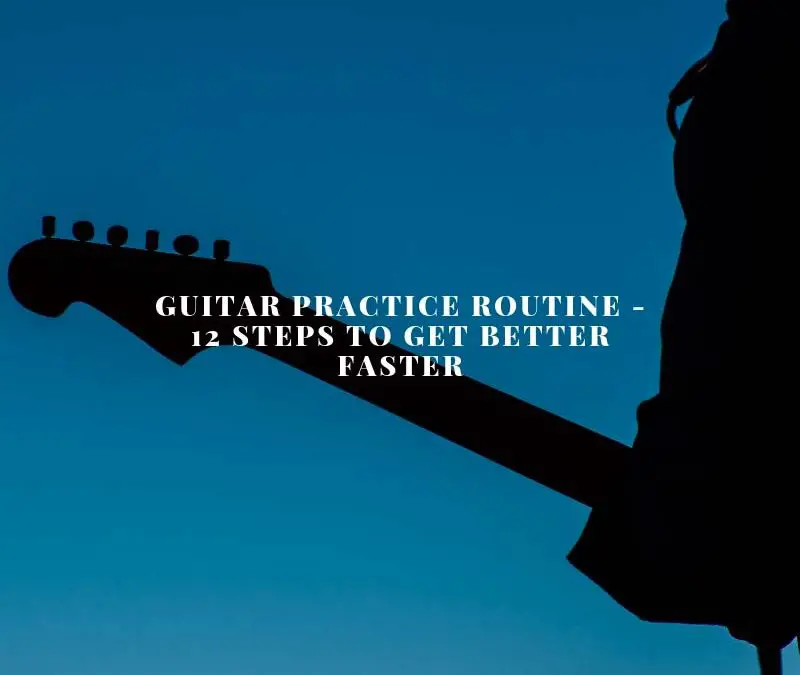You know that moment when you know you should practice your guitar but then you get overwhelmed by sluggishness and a strong desire to literally do anything else other than work your guitar practice routine? Suddenly making that sandwich or watching squirrels running around in the yard seems like the most captivating use of your time. It doesn’t matter whether you are a newbie or you are halfway to your dream of being the next Jimmy Hendrix; musician’s block is a real problem.
12 secrets to developing a successful guitar practice routine

While it is something that happens to the best of us and we can all bond over, it is a habit that could seriously hinder your musical progress. One way to protect yourself from this is by coming up with a good guitar practice routine and actually sticking to it. If you have no idea where to start with this, here are 12 simple tips that will definitely come in handy.
#1 – Free up time before and after your practice sessions

One of the greatest challenges with sticking to guitar practice schedules is tight timing. Say you get off school or work at 3 p.m. and you set your practice time for the same time. Chances are that you will be too tired to actually pick up your instrument and play. The same applies when you have activities scheduled too close to the end of your practice.
The best thing is to ensure that there is a period of maybe 15 to 20 minutes between your practice and any other event you may have. That way you do not feel the need to rush things or cancel because you won’t have enough time for everything.
#2 – Make the sessions as regular as possible
Establishing a routine in your mind might require that you make your practice sessions as frequent as possible. In fact if you can spare one hour daily for five days a week you would really achieve a lot. Spacing out your practice time too much could make you complacent and lower your enthusiasm.
#3 – Give yourself a break

I know you love your guitar probably more than anything (and maybe even anyone) else. That is ok. But every once in a while you might want to take a break. Absence makes the heart grow fonder… or something like that.
Taking this break gives you a chance to relax and escape what might sometimes feel like a suffocating routine. So every week or two give yourself a free Monday and just relax. It will do wonders to your psyche to keep practicing.
#4 – Set up a distraction-free space for your practice
Having a bunch of clothes strewn all over the floor, music in the background, and books all over your bed is probably not a good idea when practicing. This crowds your senses and prevents you from truly focusing on your practice.
The result is that your session ends up being tiresome and even boring and you just cannot wait to finish so you can leave. So clean up a little. Or don’t clean up and simply find a spot that is tidy and as devoid of distraction as possible.
#5 – Switch things up with your practice location

While it is a good idea to have fixed practice spot for the sake of routine, it is always nice to switch things up from time to time. Staring at the same pastel pink wall, sitting in the same swing chair, and breathing the same air-conditioned air might get a little monotonous for your practice sessions.
To keep things interesting, consider occasionally choosing a new location for your practice. Maybe take your little musical beauty outside and serenade the birds. It will do wonders to your routine.
#6 – Stock up on all the equipment and accessories needed
Sometimes, the reason you might not be so keen to stick to your practice routine is the fact that there is something you are missing, and you’ve got to stop everything to go and get it. It could be anything from broken picks and misplaced capos to dysfunctional amps and distortion pedals. This inconvenience reduces your enthusiasm to play and by extension hinders your overall progress. So take stock of what you need and make sure to have it before your session starts.
#7 – Keep a practice log to track your progress

Last week you learned three new minor chords and played a jazz song with them. This week you finally started to work on your picking skills.
Monitoring your progress allows you to actually see the fruits of your labor. This is a great way to motivate yourself to keep going. You can keep a journal for this or use one of the many different apps available out there.
#8 – Invest in formal lessons as part of your practice
We live in a day and age where being self-taught is pretty much a norm. However, the value of formal guitar classes is something that is really hard to argue with. They will teach you things that no blog or YouTube tutorial ever will. So in order to improve the quality of your practice sessions it is always a great idea to consider the guidance of an actual professional trainer.
If you insist on not leaving your home to learn guitar. Then I would highly recommend the best learning platform online for playing guitar. Check out my blog post on it here.
#9 – Set goals for yourself

Having something to work towards is a great way to promote discipline when it comes to establishing a guitar practice routine. Challenge yourself to learn that tricky progression. Set goals on new techniques that you want to master. You could even plan a concert and use your practice sessions as rehearsal time. In fact, do not just set goals but give yourself a time limit to achieve them. That way there will be stakes involved in your guitar practice routine.
#10 – Play your favorite songs
If you do not like country, then do not include country songs in your practice lineup. If you don’t like jazz then don’t do it. If you do not like contemporary rock then you have no business playing the guitar. Ok, maybe that is a tad too personal and dramatic, but you get the point.
Play what makes you happy. Even if it isn’t contemporary rock. Play songs that get you excited. This will make you really look forward to practice time.
#11 – Start simple and build up

If you just started playing guitar then it is probably not a good idea for you to be trying to recreate great riffs and solos with complex techniques. Take your time and build on your skills from the ground up.
Starting the other way round might end up frustrating you and lowering your chances of being consistent with your guitar practice routine. Unless, of course, you are a musical prodigy in which case go ahead and give John Meyer and Jimmy Hendrix a run for their money.
#12 – Occasionally turn it into a jamming session with friends
Finally, a great way to ensure that you stick to your guitar practice routine is by including other musicians. Jam sessions are fun, whether you’re practicing real songs or just improvising. So make friends who love music just as much as you and jazz up your practice time. See what I did there? No? Too much? OK. Just play with your friends and your sessions will be a lot more fun.
Bottom line
The temptation to avoid practice is very real. However, by keeping things interesting and making matters as convenient for you as possible, you will not have a reason to flake out.
So mark that hour in your weekly calendar, set up your space all nice and cozy, and come up with a killer playlist to keep you working hard and having fun. These and all the other tips on having a successful guitar routine will definitely go a long way towards getting you closer to your dreams of being a guitar legend. Or at least mastering that C chord.



